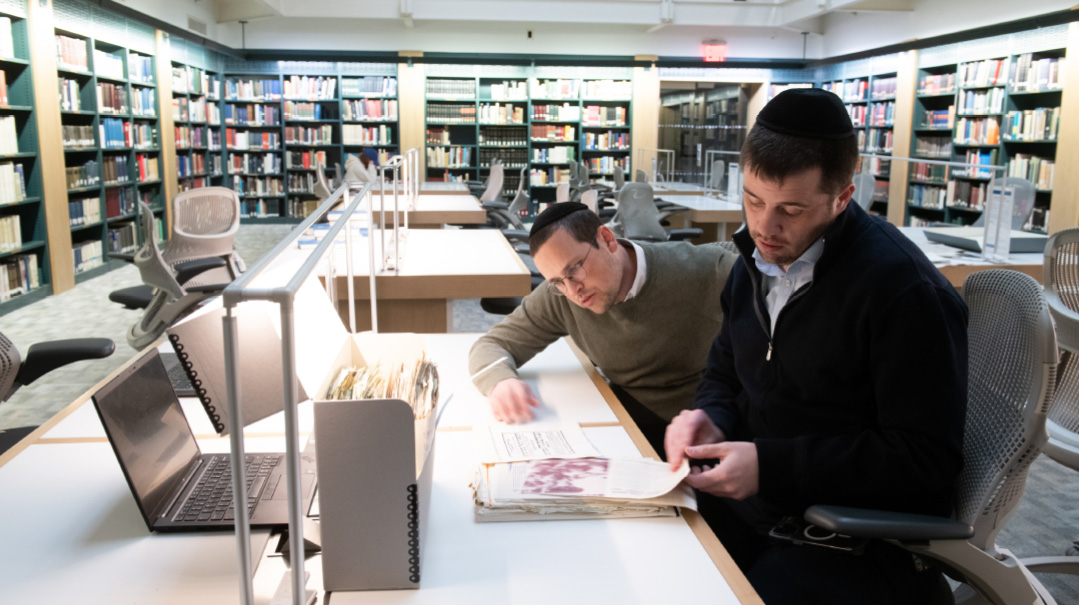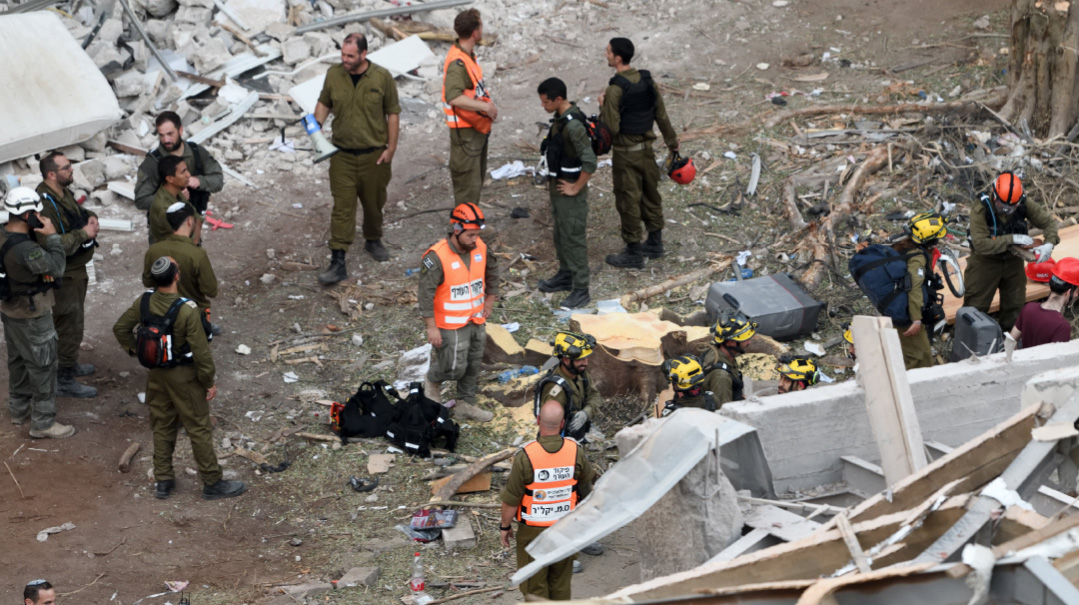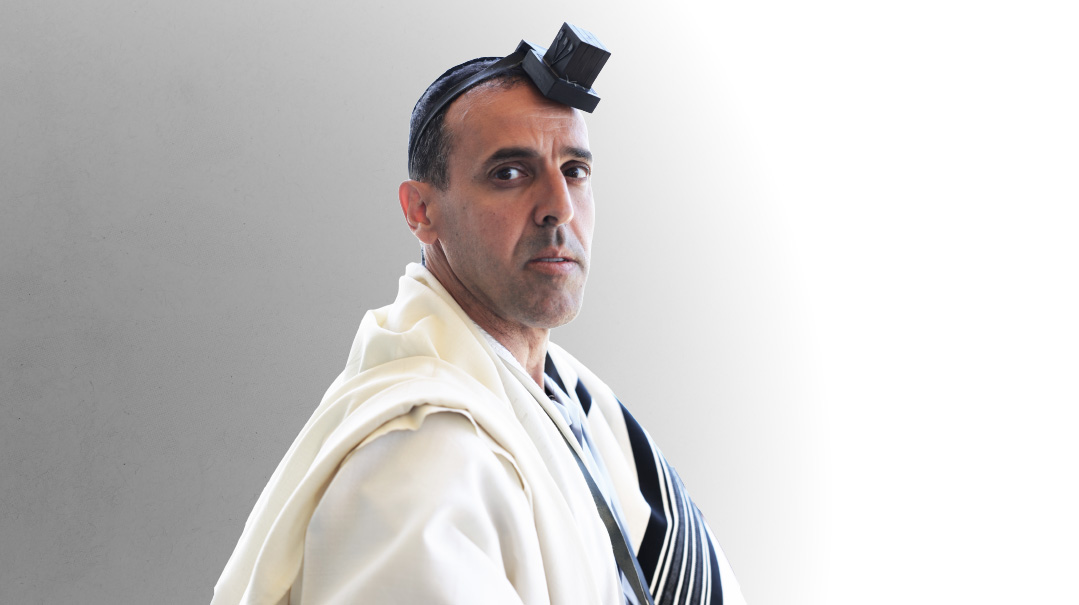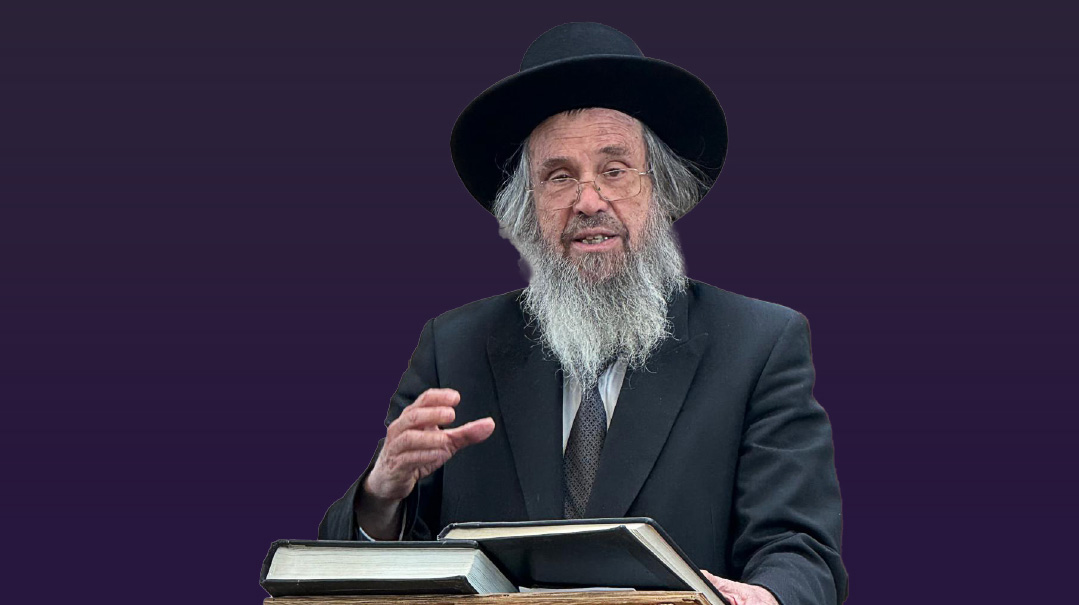Home on the Range

The teens are part of initiatives that aim to let the outdoors work its magic where the classroom has failed
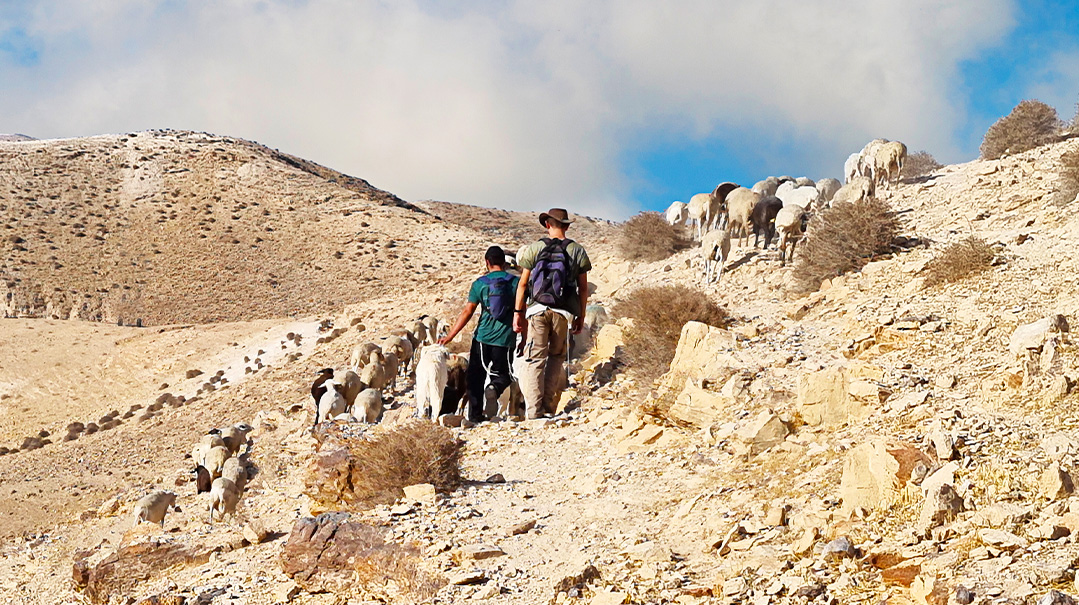
Photos: Shlomi Trichter
UP and down Israel, small start-up nonprofits are joining established programs to get young people who have not found their place in mainstream chareidi frameworks into the worlds of welding, mountain bike instruction, shepherding, and tracking. The people running these projects are as diverse as their clientele, but they share one common motivation:
Happiness is a basic requirement for children to succeed
Like a Rosh Hashanah machzor come to life, the sheep wait at the gate on the edge of the Judean Desert, jostling to be first in line to file by the shepherd.
Dodge, a black an d white border collie, nips at their heels as they move down into a gulley bordering the farm next to Mitzpeh Yericho, half an hour from Jerusalem.
To soft commands of “sha’on” and “neged” — Hebrew for clockwise and counter — the dog darts right and left of the flock, steering it into the hills.
The sound of a thousand hooves fills the air. As the gulley widens, the sheep rush forward, their movement oddly like an undulating sheet of water.
They burst through a straggly clump of trees, teeth snapping at the tasty leaves overhead. Then, like the Light Brigade, they charge onward.
Suddenly, there’s a road ahead, and as the sheep surge across it, a bus comes to a halt, and out spill tourists, lenses flashing.
Arriving over the narrow mountain route from Palestinian Authority–controlled Jericho, they’re likely Europeans, expecting to see Bedouins herding their flocks over the harsh terrain.
Instead, the scene defies the neat stereotypes of the guidebooks they likely consult.
Because presiding over the 270-strong herd aren’t dusty nomads, but something more Biblical.
Two fresh-faced Jewish teens, black yarmulkes, swinging tzitzis and windblown peyos marking them as chareidi, act as shepherds — for all the world like something from the pages of Tanach.
As one of the shepherds picks up the sheepdog and lovingly cuddles it as he walks past the bus, the ooh-ing and aah-ing redoubles.
Then the flock is gone, a dust storm marking its progress into the mountains.
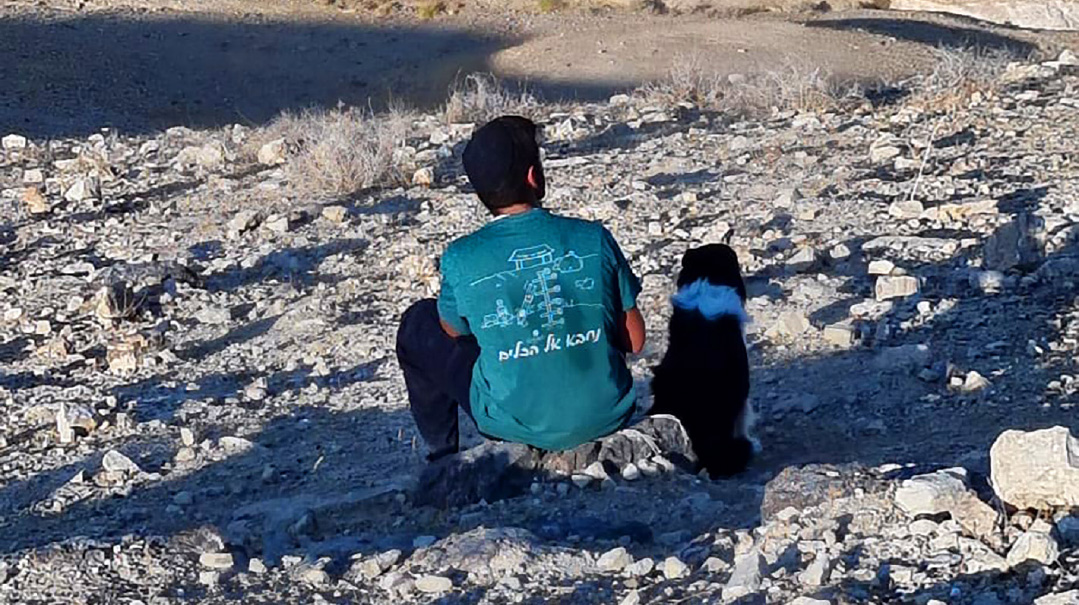
Whatever the tourists thought of the picturesque scene, the reality is far more interesting than an unusual photo-op.
The teens are part of an experiment at the interface of agriculture and chinuch: a series of grassroots initiatives that aim to let the outdoors work its magic where the classroom has failed, that are now coalescing into a larger national effort.
“There are many organizations that deal with kids at risk, and most see their end goal as getting the teens into a formal study framework,” says Shmuel Litov, CEO of the Bnei Brak municipality and deputy chairman of the KKL, the quango responsible for large tracts of Israel’s land that is funding the initiatives.
“But what if the teen is simply not built for studying many hours a day? Such a student will quickly learn that he or she is a failure, and often turn to the streets where other outlets can provide them with a false high.
“So, we’re building and funding a new type of project, where teens can work in the practical world, and taste success immediately.”
That’s why up and down Israel, small start-ups are joining established programs to get young people who’ve not found their place in mainstream frameworks into the world of welding, mountain bike instruction, shepherding and tracking.
Over one long Elul day, I drove and hiked some of Israel’s most pristine, wild territory on the trail of the budding outdoorsmen.
It was a journey into a mixture of educational innovation, ideology, and human emotion playing out against a background of windswept beauty.
I met chareidi dropouts fresh off the streets of Bnei Brak and Yerushalayim, far stronger boys from regular yeshivos in the process of finding themselves, and troubled hilltop youth of Yehudah and Shomron.
The problems of each sector are so radically different that it’s difficult at first to find a common thread. But sitting on the roof of the world with Dodge the faithful sheepdog, looking down on the mountains rolling toward the horizon, I was able to glimpse the big picture in a conceptual sense as well.
It’s clear that there is a percentage of kids who, come what may, are not built for long hours in the classroom; for them, the call of the outdoors is stronger. Do we have to wait until they hit hot rock bottom before connecting them to what they love?
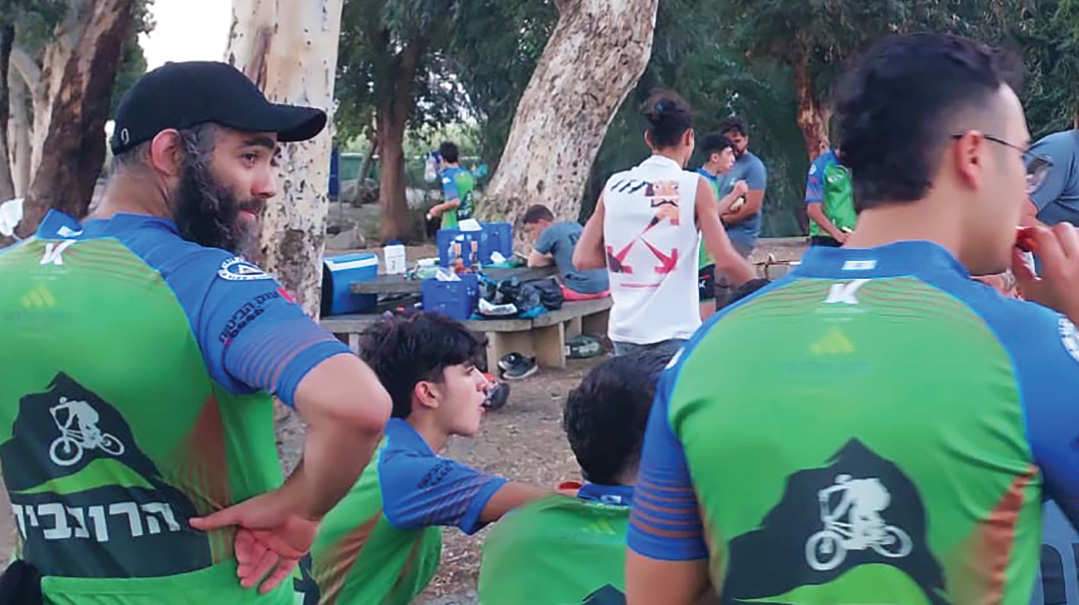
Biking Uphill
They were yeshivah rejects who landed on the streets. Can Israel’s grueling bike trails lead them to a new sense of accountability and positivity?
The shabby prefab beis medrash-slash-youth center in Ramot could be any one of the hundreds of outreach programs that dot Israel, from Maaleh Adumim to south Tel Aviv.
Inside the modest building that huddles next to a vast new yeshivah ketanah — a leading institution that caters to the chareidi mainstream — dark-skinned teens sit around, sporting earrings, shaven heads, and bike helmets.
White-shirted avreichim run the show, and processed rugelach plus assorted pitzuchim adorn the chipped Formica tables.
A closer look reveals that this isn’t a kiruv center in the classic sense. The lecturer isn’t telling a parshah story or delivering inspiration for life.
He’s giving a first-aid course.
“Signs of dehydration could be dizziness, headaches or cramp,” says the man in the Magen David Adom uniform. “It’s a problem in Israel in general, but especially in the riding conditions outdoors.”
The teens listen attentively, asking questions and volunteering answers with a focus and intensity that show how important the session is to them.
That’s because the 14- to 19-year-olds — many of whom roamed the streets of chareidi cities until just a few months before — are intent on qualifying as biking instructors.
To win their golden ticket to respectable employment, the students need to pass multiple courses: bike mechanics, outdoor navigation, riding skills and of course first aid.
Meeting three times a week, the 15-strong group spend time on theory, and then head for the hills to apply what they’ve learned.
Ozer Levinstein from Bnei Brak is the brains behind the project. Employed by the Bnei Brak Municipality — which took an early lead in funding programs to handle the city’s off-the-derech problem — his day job involves placing struggling youth in appropriate frameworks.
“For 50 percent of struggling teens in the chareidi world, the existing range of frameworks, including different levels of yeshivah, are effective,” he says. “But there are many cases when the students simply have no chance in a setting that is geared toward academics. So, they fail, and drop out.
“They get locked in a downward spiral and see themselves as failures. They end up not being able to get up in the morning, and can’t hold down a job in a supermarket for more than two days.”
To fill that void, Levinstein wanted to create a program in which nonacademic success is within striking distance immediately.
“Being a biking instructor carries cachet on the street, it’s a real job, and it involves responsibility. These boys head out on mountain bikes with their green and blue biking kits. It’s a very difficult course — they fall, they flip over, and they’re driven very hard as they learn how to handle the bikes. But they love it.
“Just yesterday, three boys from our program took some executives from Bank Hapoalim out for a day on the trails. Imagine what a boost it is for a 15-year-old who’s never seen success, to be teaching the manager of a bank how to repair a punctured tire.”
Sitting first in the row next to the paramedic, Eliyahu is a typical member of the program. Age 17, he comes from a well-known chareidi family in Bnei Brak, and cycled through mainstream yeshivos before heading out of the system.
When the boys in the group are asked to speak about how they reached the program, he’s happy to go first.
“I was in a yeshivah ketanah where I didn’t do well, and then I went to a more relaxed place, but it also wasn’t a good fit for me. Eventually, I ended up spending a year and a half at home, until I heard about this program. It’s given me a sense of achievement.”
After Eliyahu, others take their turn to share their thoughts. Many have similar stories: failure in yeshivah leading to the street and their current state.
Some, though, are very wary. One boy who loudly declares his right to remain silent is representative of some of the very difficult family circumstances that have turned sweet schoolchildren into street toughs.
Each of this particular teen’s divorced parents actually fought to shift custody for him onto the other. Without a home to call his own, he boards with one of the counselors.
Another of the participants, who comes from a chassidic home, fell out with his father when he brought home a smaller yarmulke.
“You can’t stay here if you put that on,” his father told him.
“Okay, then I’ll sleep on the streets and cut my peyos off too,” the teen replied.
It’s clear from talking to the group that there’s no one single predictor of dropping out, but there are several markers. Broken homes, untreated learning difficulties, and molestation are triggers. But sometimes the reason is less clear.
“We can’t always explain why some kids don’t make it,” says Ozer Levinstein. “Sometimes it can be geographical — there are a couple of neighborhoods in Bnei Brak with extremely high dropout rates, so it’s obvious that one child can drag his classmates down.
“But one thing is clear,” he warns. “If your child is struggling, don’t continue to insist that he stays within a ‘respectable’ framework just for your own prestige. Because eventually he’ll end up needing help, in a far worse state. You can have your child come here in a taxi, or an ambulance.”
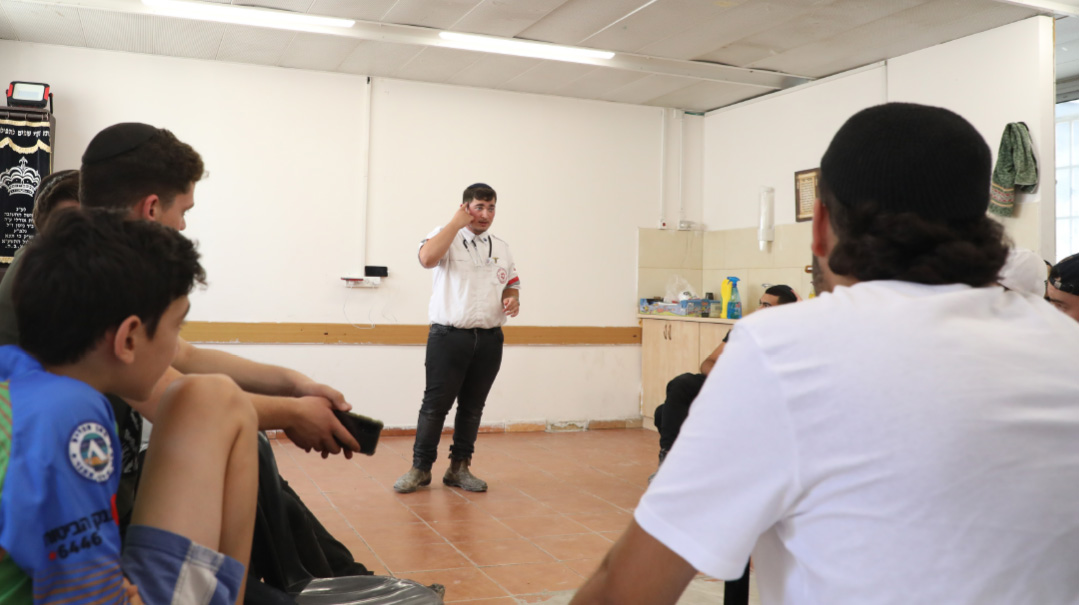
Teens listen attentively at a first-aid course offered as part of a training program for biking instructors in Jerusalem’s Ramot neighborhood. “Being a biking instructor carries cachet on the street, it’s a real job, and it involves responsibility,” says Ozer Levinstein, the project founder
Slow Cooking
It’s a Thursday afternoon, and cholent-making paraphernalia covers the fading stone countertops at the side of the room. If an army marches on its stomach, this bikers’ outfit is equally powered by food.
The boys have been busy preparing a Leil Shishi stew, together with the counselors. They’re expected to clean up as well, which is all part of the idea.
“When you’re working with kids who spent time on the streets, the first thing they need is discipline and motivation,” says Ozer Levinstein. “They’re not used to accountability, of having to keep to a schedule. So when they don’t have something that they really want to do, they’ll be up drinking all night and then be unable to come to their programs next day.”
To break that cycle, the week is built around the Wednesdays. Since the outdoor sessions are the focus of their week, the teens will do everything — including getting a decent sleep on Tuesday night — to ensure they’ll show up on Wednesday morning.
Wednesday’s activities are so intense that they arrive back too exhausted to party, and are then fresh for Thursday’s session.
It’s that focus on building the “mensch” through the great outdoors rather than focusing on nonobservant behavior that defines Ozer’s approach.
“The core problem is not with their Yiddishkeit, but with their total lack of self-confidence,” he says. “That’s why as soon as they taste success, many start taking on more. Make no mistake: the boys are connected to Hashem, and when they feel self-respect, they’ll come in to daven and start putting on tefillin again.”
Four months into the program funded by the century-old development corporation Keren Kayemet L’Yisrael (KKL), the success of the initiative can be measured on the streets of Bnei Brak.
A father researching the best program for his troubled son kept hearing from his son’s peers about a new program with desert survival trips and bike courses that seemed to have established street cred.
“What’s this new program all the kids are talking about?” he called Ozer to find out. “They call it the Yeshivah of KKL.”
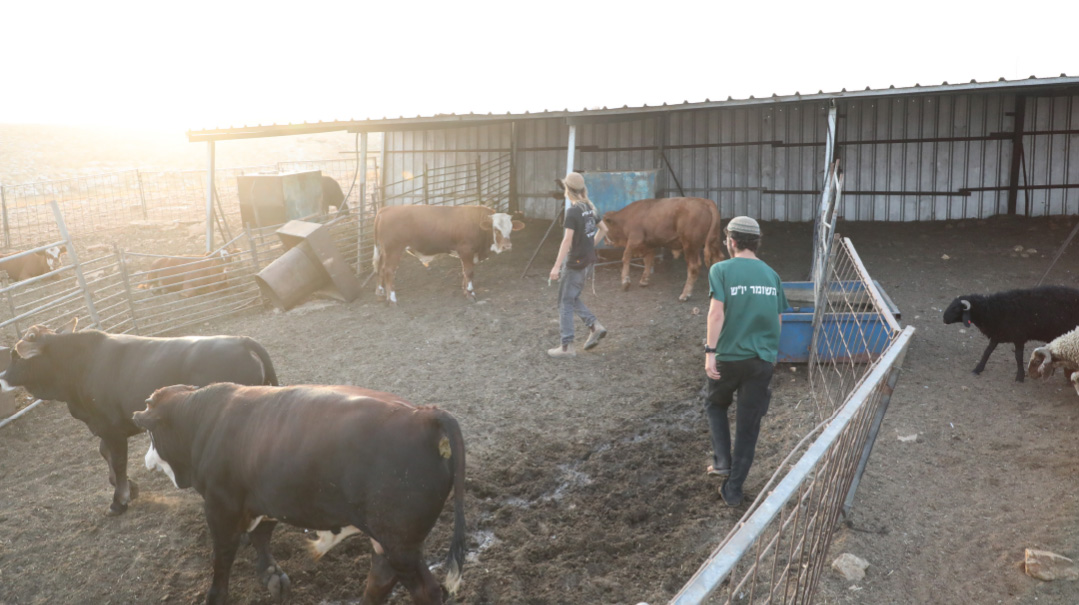
“We go out every morning and afternoon with the flocks, with a double aim,” explains a teen working on a farm in the Shomron. “We want to feed the animals, and we want to claim territory”
No Fear on the Frontier
Ideology and education merge in a program for youngsters who’ve dropped out of the national-religious school system. They’re discovering new strengths as farmhands in harsh territory
TOhead north of Mitzpeh Yericho is to enter bandit country. Known since the late ’60s as the “eretz hamirdafim” — or land of pursuit — the area has a bloody history.
From 1968 until 1970, hundreds of terrorists entered Israel through the Jordan Valley, and were hunted down and killed by IDF forces over the exceptionally difficult terrain. Many senior IDF officers lost their lives in these battles, leading the army to reconsider its “officer first” commanding ethos.
Route 458 traverses the sweeping, empty hills of the area, traveling north as part of the strategic Allon Road, which runs north along the eastern watershed of Yehudah and Shomron.
This is an area of fierce struggle for the future of Israel, and it plays host to a sight that’s shocking to urban sensibilities: Jewish families living, like nomads, under canvas.
Greeting us is a thickly bearded, stocky farmer, the head of one such family. Given the intense scrutiny by left-wing organizations of every movement that Jews make in the area, he insists that no identifying details be published.
His homestead, built entirely from canvas advertising hoardings stretched over a wooden frame, it is the last word in cheap housing.
Subject to legal challenge, the land, so far, is free. Water comes via pipe from the yishuv some distance away. Electricity is produced via a solar array. And the view from the shaded patio is quite literally, stunning.
Mile after mile it stretches on, the land gently rising and falling until it merges with a majestic mountain ridge in the distance. This raw enclave distant from the conventions and judgment of society has proved the perfect setting for troubled teens to find inner peace. In a neat twist, it also complements the ideological aims of this slice of the national-religious sector.
It’s late afternoon, almost shkiah, when we arrive at the farm, and find a group of teenage boys who wear the Hilltop Youth look with pride — giant knitted kippah, flowing wild peyos, heavy boots — serving as the manpower at this remote outpost.
Sitting in the shade of the pergola, some of the teens take up the story of how and why they became sheep-farmers in the 21st century.
“We go out every morning and afternoon with the flocks, with a double aim,” explains one. “We want to feed the animals, and we want to claim territory.”
The connection between herding and settlement has come to the fore in recent years. Nowadays, new building in the West Bank is mostly about expanding existing settlements. There’s almost no chance of legally founding new settlements in contested areas anymore.
In that vacuum of organized development, individuals with passion and grit have stepped forward. Over the last five years, over 50 farms like this one have been founded. The modus operandi is simple: a family moves in, builds a cheap structure, begins farming, and creates a Jewish presence on state-owned land.
“When we come with our herds, the Arabs who are spreading illegally over this land — which is state-owned land — naturally move back. It’s the most effective way of safeguarding the country.”
The KKL funding now going to the educational aspect of this project is noteworthy, given that the site is deep inside the West Bank. For decades, Reform and left-wing control of the KKL meant that the organization’s bloated budgets — secured via a percentage of every house sale in the country — never included so much as a penny for causes over the Green Line.
The advent of Rabbi Pesach Lerner’s Eretz Hakodesh slate in the World Zionist Organization two years changed that. With a right-traditional bloc holding power in the veteran organization for the first time — via Eretz Hakodesh’s Shmuel Litov, who holds a seat at the KKL’s table — money can finally go to educational projects, even if they’re in Yehudah and Shomron.
Counter-culture
To say that there’s a strong element of danger involved in sending unarmed teens into a West Bank swarming with Palestinian killers is obvious. But it ignores the fact that these are a totally different breed of people.
Tough Jews, you might call them. There’s nothing soft about them; they’re self-reliant and highly ideological. Tent living is part of their ideology as well.
“Why do you need more?” says our host’s wife, gesturing at the interior of her tent-house, which is divided into three main rooms with clapboard partitions. “We’re genuinely happy, and this cost us just a few thousand shekel.”
In this breezy weather, the children play outside. No one seems to bat an eyelash as a blond toddler, climbing over the rocks and grass outside the front door, pitches over, and then rights himself by hugging the neck of a giant guard dog.
In his element outdoors, the farmer is teaching the boys the art of tracking.
“The IDF has always relied on Bedouins as trackers,” he explains, “but as the Bedouin population urbanizes, they have to be taught those skills themselves. It grew clear that the IDF couldn’t rely solely on Bedouins, so a Jewish trackers’ unit was established.”
Having spent hundreds of hours in the desert, learning through experience to recognize the different traces that animals leave, graduates of the farm have brought those skills to the IDF.
In addition, the farm employs an Arabic teacher for the boys, who are keen to bring the skill both to the army and to their lives in these hills, where interacting with the local Arabs is part of the daily existence.
In this frontier land, the boundaries between education and ideology are blurred. The head prefers to focus on his ideological motive for hosting a band of teens on his farm, but an outside consultant sees real educational benefits in the program.
“For sure there’s ideology, but these teens look different from their parents or may of their peers. They’ve dropped out of school and have diverged from the norms of their society, which involve some sort of structured educational experience — either fulltime yeshivah or high school — until they’re old enough for army service.”
Whether or not their sheep farming is actually establishing sovereignty, the reality is that these boys, who never found their place in the classroom, are learning real skills and holding real responsibility, as productive and functional farmhands who find meaning and structure from their life in these wild environs.
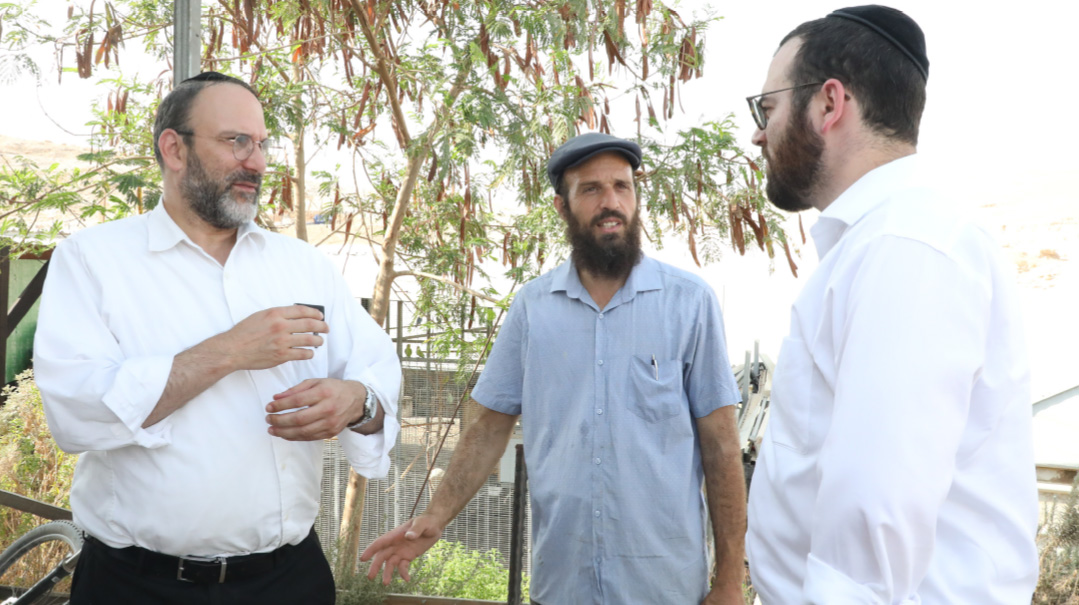
“This is not a place for boys with smartphones and on drugs,” says Yechezkel Friedman (middle), founder of Lechatchilah Farm and a product of one of Rav Steinman’s yeshivos in Bnei Brak
Safe Pasture
They’re yeshivah bochurim who eschew computers and digital devices — but after morning seder, they head out with the sheep. As they guide their flocks to safe pasture, they’re finding peace for their own stormy selves
IF
you ever wanted to shoot an Israel-themed Western, the edge of Mitzpeh Yericho would be a good location.
Instead of heads of cattle, think sheep. In place of forbidding outcrops in Utah, take the mountains with their brooding Bedouins framed against the skyline. And instead of a cowboy riding to the rescue, take pickup-driving, pistol-packing Yechezkel Friedman.
The founder of the “Lechatchilah Farm” is an educational pioneer, who has dedicated his life to building an outdoor alternative for chareidi youth.
A building contractor by day, Friedman plows the profits into a farm whose name means both “optimal” and is an acronym for a Hebrew version of: “Not Every Talmid Must Learn a Lot.”
A sprawling collection of caravans, barns and workshops on a hillside just off the Jerusalem–Dead Sea road, the farm is less than five years old, but is already taking on the air of a small colony.
When we arrive at lunchtime, morning seder has concluded in the ramshackle beis medrash, and the place is a hive of manual activity.
One teen is busy tending to sheep that have given birth, another is feeding a penful of frisky, baa-ing lambs. Less appetizingly, a third walks past with a dead lamb swinging jauntily in one hand, which he deposits in a pile of hay, presumably for quick disposal.
“This is not a place for boys with smartphones and on drugs,” Yechezkel says. “The profile here is teens who may have ADHD or some other reason why they can’t sit for ten hours a day learning. But they’re good boys, and so when they have an outlet, they’re able to spend three concentrated hours in the beis medrash in the morning.”
Stopping random boys dressed in work clothes and engaged in everything from painting their cabins to farm work, I hear names of mainstream yeshivos in Kiryat Sefer, Yerushalayim, and Yesodot they’ve either left or taken some time off from.
The farm is well and truly on the bochurim radar. There are even three bochurim from Lakewood staying for a few days. One says he’s seriously considering going into agriculture back home, and wants to gain experience.
Baruch, originally from Zichron Yaakov, is busy digging the foundations for a new hut. It’s strenuous labor, and he’s sweating profusely under the sun even with a peaked cap.
His tzitzis and beard show that his journey from yeshivah to farm wasn’t a rebellion against constricting religious standards.
“I just feel so much calmer when I get out my energy, in a way that I couldn’t in yeshivah,” he says, pausing over his hoe. “This type of labor isn’t for everyone — most can’t take the physical effort of construction, so they deal with the sheep. But it works for me.”
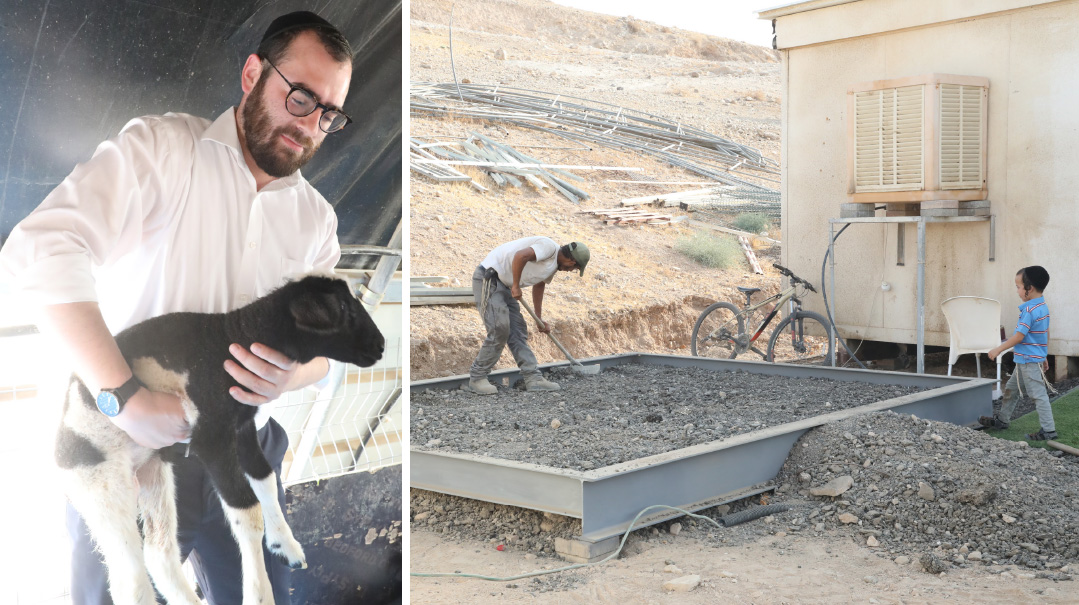
“I just feel so much calmer when I get out my energy, in a way that I couldn’t in yeshivah,” says Baruch, originally from Zichron Yaakov, now working on Lechatchilah Farm at the edge of Mitzpeh Jericho. (Right) Mishpacha’s Gedalia Guttentag gets a feel for the farm
Success Story
For the ten or so full-time students, and dozens who rotate in regularly for a few days, success is the watchword that governs life here.
“When I hear a boy who has failed in his previous life say that he managed to help a sheep give birth, I know he’s grown as a result,” says Yechezkel, sounding like Ozer an hour away in Ramot.
“When you have a bochur who failed his tests and was the bottom of his school grade now succeeding in a welding course, then he says to himself, ‘Maybe I can succeed at Gemara as well.’ Success breeds success.”
If self-actualization is the goal, why does he offer a course in farming rather than computers?
“First, I don’t want the boys on computers, which are unhealthy,” he replies. “But we’re also an ‘instant’ generation — the teens crave quick success, and that you can get by working with animals.”
Yechezkel Friedman is himself no stranger to that search for success. Although his garb is a combination of Breslov and settler, he was born in a classic home in Emanuel, a remote chareidi yishuv in the northern Shomron.
“Twenty-five years ago, I learned in Bnei Brak in one of Rav Steinman’s yeshivos, Gaon Yaakov,” he says, pronouncing it “Ge’on Yankev” in true insider fashioner.
“I wanted to go to work, which back then in that setting was unusual. I left the yeshivah, and although it was very hard for me, I stayed strong. I got involved with farming and construction, which I’ve kept up until today.”
The difficulty of those early experiences led to a burgeoning solution for the next generation.
“I promised myself that if I was successful, I would set up a framework for chareidi kids to follow my path. There are many good kids who don’t want to drop their religious standards — they just need to be out in the open.”
Herd Mentality
It’s mid-afternoon, and the sun is still high overhead by the time that we head out the back of Lechatchilah with the sheep.
Like the flock, I’m in the care of Shmuel, a 19-year-old, yeshivah-educated shepherd. Having qualified to take the sheep out on his own six months ago, he’s an old hand, suitably sunburned and wearing the herdsman’s leather hat.
Dodge the collie, and Buba, a big white guard dog that likes to slobber fondly over friends and acquaintances, obey him smartly.
Talk about not dressing for the occasion. My white shirt, showing up starkly against the rocks, will come in useful should we need to be airlifted out. But my running sneakers are definitely not up to par as we follow the sheep up a steep incline.
“David,” Shmuel calls to the younger, trainee shepherd, pointing at a sheep that is lagging a bit. “Keep an eye out for this one, it might be sick. If we need to, we’ll call someone from the farm to pick it up.”
A reminder of the dangers faced by an animal that separates from the flock comes in the form of a wolf-sighting further down the slope.
“Lech!” urges Shmuel softly, and both dogs fly off down the slope toward the threat, which turns tail and runs.
“That’s why we have the guard dog,” he says. “Dodge the sheepdog will attack anything that’s a threat to the flock, even if it’s far too big for him.”
As the sheep clamber the hills, and the farm vanishes behind us, basic math tells me the level of responsibility that these teens take on, and which is an integral part of their education.
The farm raises sheep to be sold for meat, and each of the 270 animals in front of us is worth NIS 2,000, valuing the flock in front at a cool half-million.
“We have to make sure that the sheep aren’t stolen by Bedouins who also pasture in these hills, although generally nowadays they know that this is our territory.”
It’s not just the value of the animals that demands maturity from the teens. Shepherding is hard. Each shift — one leaving at 5:30 a.m., and the second at 3:30 p.m. — spans between four and five hours, much of it physical movement and watchfulness.
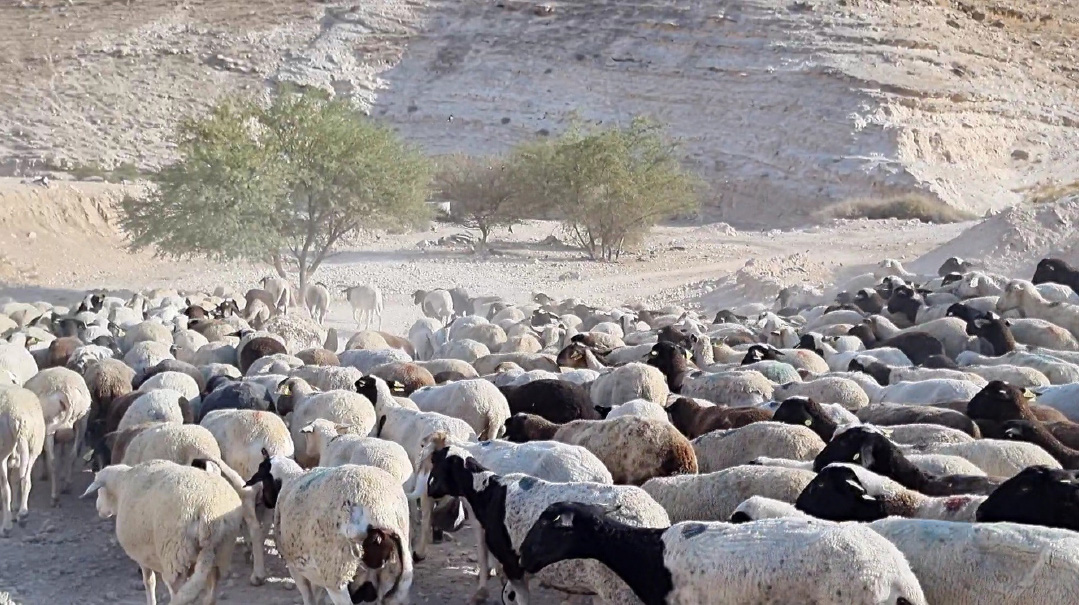
Mountain Refuge
Twenty-five minutes after we set off from the Friedman homestead, it feels like we’re looking down on the rest of the Judean Mountain Range. Hopping over a series of trenches that lead to a steel lookout emplacement gazing out toward Jericho, we sit ourselves down and soak in the vastness.
There’s a beautiful breeze, and the dogs come over to Shmuel and thirstily lap at the glass bottle he offers, like two massive, dehydrated babies.
“I went through the regular Israeli cheder and yeshivah system, and was until recently in a big yeshivah gedolah,” he says. “But I wanted to be outdoors. I heard about the farm from a friend, and started to come here, and then moved here full-time.”
Shmuel is a well-spoken, thoughtful bochur who seems — like many of his peers on the farm — to be going through a process of self-discovery. He doesn’t necessarily envision a future in farming per se, but sees value in the skills that he’s picked up in what seems to be a process of self-realization. “We learn confidence here as well as practical skills, although I’m better with the animals than with tools.”
Sitting further than the hill on his own is David, and I go over to join him as he gazes at the view, seemingly lost in it all.
“I’m 14 years old, almost 15,” he announces, surprising me. Given his large build and air of quiet maturity, I’d taken him for at least 16 years old.
Raised in Kiryat Hayovel, Jerusalem, David spent years failing his way through different schools and yeshivos. “I’m not able to sit and study so much, both Gemara and general studies,” he says softly. “Eventually, I started hanging out on the streets, and then stopped leaving the house at all.”
By word of mouth, which seems to be the farm’s principal advertising mechanism, David heard about Lechatchilah and arrived a week ago. He feels transformed already.
“I love the animals, and I really want to be able to take them out on my own. I have no problem getting up for a day like this, going to Shacharis and sitting in the beis medrash when I know that this is waiting me.”
Far below us, the goats have spread out over the valley. From a distance, it’s impossible to see what sustenance they’re finding in the parched, desert ground. But clearly, from the contented grazing, it tastes good.
There’s a shy look on David’s face as he looks down at his charges, and into the distance at the hills, and tries to explain what he feels.
“Calm,” he says. “It’s so peaceful out here.”
Not a Slogan
Traffic is light and the road is bathed in gold as the car climbs away from the Jordan Valley toward Jerusalem.
When one is surrounded by history, it’s easy to get carried away on the potent imagery of Jewish shepherds once more roaming the land. But trying to create a sense of coherence across a variety of very different experiences that I’ve seen risks imposing an order that doesn’t exist. The biking program is miles away from the farms, and the farms themselves have little in common.
Still, despite the vast differences between different types of education systems, common ground emerges when it comes to those young people that our industrial-scale education systems can’t digest.
Those who are too unusually shaped to be stamped in our cookie-cutter molds; those who can’t take the heat of the academic kitchen and head for the exit.
The truth of the current scattershot, grassroots efforts to get kids back to nature currently underway across Israel could be more widely applicable across the frum world.
“We should never forget that happiness is a basic requirement for children to succeed,” says Yechezkel Friedman of Lechatchilah Farm. “Chanoch l’naar” is not just a slogan — it’s a reality. If a child is getting the pleasure from full-time Torah learning, what more could you want?
“But if not,” says the man whose dream to help others has become an oasis for struggling teens in the Judean Desert, “then whether it’s a farm or some hands-on solution closer to home, we need to think out of the box.
“Because without fulfillment, a teen has nothing.”
(Originally featured in Mishpacha, Issue 931)
Oops! We could not locate your form.


